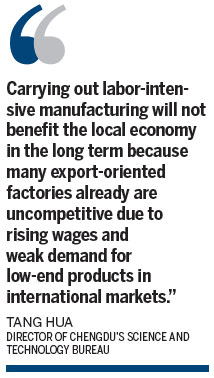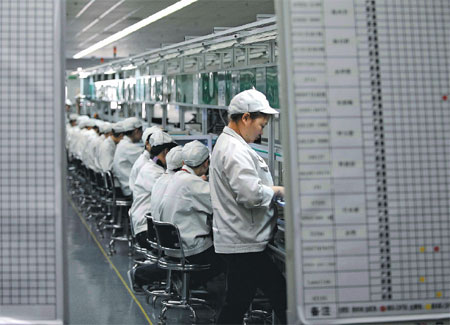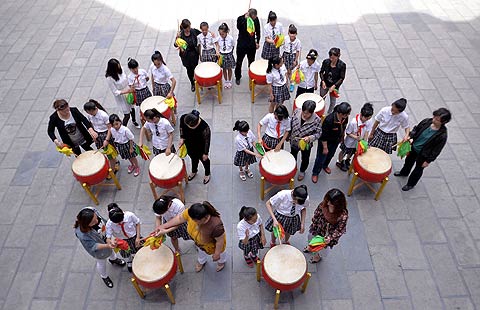High-tech park growing local innovation
Updated: 2014-05-16 07:14
By Zhong Nan and Li Yu in Chengdu and Lu Haoting in Beijing (China Daily)
|
|||||||||||
Chengdu's primary goal is to catch up with Shenzhen and Tianjin in boosting exports
Chengdu plans to launch more high-tech enterprises over the next three years to drive the city's economy and innovative strengths amid China's industrial upgrading.
Home to 252 multinational Fortune 500 companies, including Intel Corp, Suez Group, Siemens AG and Toyota Motor Corp, Chengdu is taking steps to enhance innovation in local companies by learning from the foreign businesses. The goal is to catch up with such longer-established rivals as Shenzhen, Dalian and Tianjin in China's eastern region.
Tang Hua, director of Chengdu's science and technology bureau, said the city will invest 1 billion yuan ($162 million) this year to support industries such as e-commerce, pharmaceuticals, 3-D printing, vehicles and new materials to boost exports and build more national brands.
"Carrying out labor-intensive manufacturing will not benefit the local economy in the long term because many export-oriented factories already are uncompetitive due to rising wages and weak demand for low-end products in international markets," Tang said.
The Chengdu government is focusing on developing company leaders in high-tech fields, particularly small and medium-sized enterprises.

It also is offering subsidies of between 200,000 yuan and 1 million yuan for new product development to local companies. Because carrying out research and development for pharmaceutical products is a lengthy and expensive process, the maximum subsidy for this sector was raised to 4.2 million yuan for a single product.
Supported by favorable government policies and surging export orders, particularly from Europe and the United States, the output value of Chengdu's high-tech industry hit 512 billion yuan in 2013, an increase of 25 percent from the previous year, data from Chengdu's municipal development and reform commission showed.
Electronic information, biological medicine, new energy, new materials, optical and electrical integration, aerospace and other strategic emerging industries accounted for 70 percent of the industry's total output.
As many Chinese cities set new, higher targets for high-tech projects and supporting facilities in order to enhance their resident companies' global competitiveness, Chengdu's High-Tech Industrial Development Zone also altered its goals for future development. It aims to build itself into a world-class technology park with gross industrial output reaching 1 trillion yuan by 2020.
Since its establishment in 1991, the industrial development zone has gone through several phases, and it now specializes in developing IT, biomedicine and precision instrument manufacturing.
Its output value totaled 104 billion yuan in 2013, up 19 percent from a year earlier. Its foreign trade volume reached 24 billion yuan last year, ranking third in the country.
"The high-tech zone's next move will focus on developing strategic emerging industries, including mobile Internet, core electronic devices manufacturing, software, biomedical engineering, aeronautic equipment, new materials and advanced environmental protection," Tang said.
Chengdu Guibao Science and Technology Co is one of many high-tech companies that reflect this trend. It received 7 million yuan from the government in 2013 to support R&D in vulcanized silicone sealants, which are widely used in construction curtain walls, energy-saving windows and doors, automobile manufacturing, the new energy industry and airports.
Cao Zhenhai, chief financial officer of Chengdu Guibao, said the government offered land for expanding its manufacturing facilities in the high-tech zone in 2006. With more research labs, workshops and researchers, its production capacity rose from 3,000 metric tons in 2006 to 23,000 metric tons last year.
The zone's service department holds regular briefings to keep enterprises abreast of national and local policies on subsidies and tax rebates, he said.
"These briefings are quite useful," said Cao. "They help us learn about municipal, provincial and national policies, innovative achievements by successful foreign companies, as well as the supply and demand data of international markets provided by consulting companies."
Chengdu Guibao's sales revenue reached 543 million yuan in 2013, up 25 percent year-on-year. It exported 2.8 million yuan worth of products to overseas markets last year.
Zhang Qizuo, a professor at Chengdu University, said China's national strategy to build the Silk Road economic belt, grow consumption and apply new technologies in western China will help to optimize the city's industrial and human resources structure over the next decade.
"Chengdu is one of a few Chinese cities that combines a large pool of young professionals with a better but less expensive lifestyle that is due to the opportunities presented by the city's fast-growing high-tech industry," Zhang said.
Supported by 57 universities and more than 40 vocational colleges mostly specializing in heavy industry, electronics and automation, chemical and computer science, Chengdu added 250,000 university graduates and 80,000 professionals from vocational colleges to China's labor pool in 2013.
"To tackle the problems of talent shortage and the rising cost of labor, Chengdu's government signed agreements with 20 local universities last year to provide both local and foreign high-tech companies with quality professionals who can work in the city after their graduation," said Tang, from Chengdu's science and technology bureau.
Contact the writers at zhongnan@chinadaily.com.cn, liyu@chinadaily.com.cn and luhaoting@chinadaily.com.cn
|
A production line of Molex Interconnect (Chengdu) Co Ltd, which is in the Chengdu High-Tech Industrial Development Zone. The zone aims to be a world-class technology park with gross industrial output of 1 trillion yuan by 2020. Xinhua |
Hot Topics
moon rover air defense identification zone CPC and reform China and Japan air pollution Cameron in China
Editor's Picks

|

|

|

|

|

|







